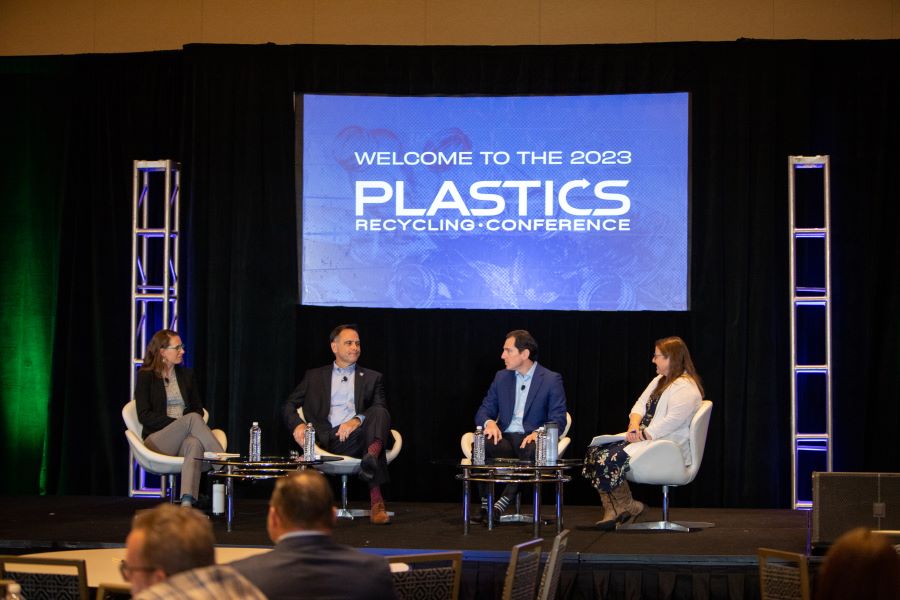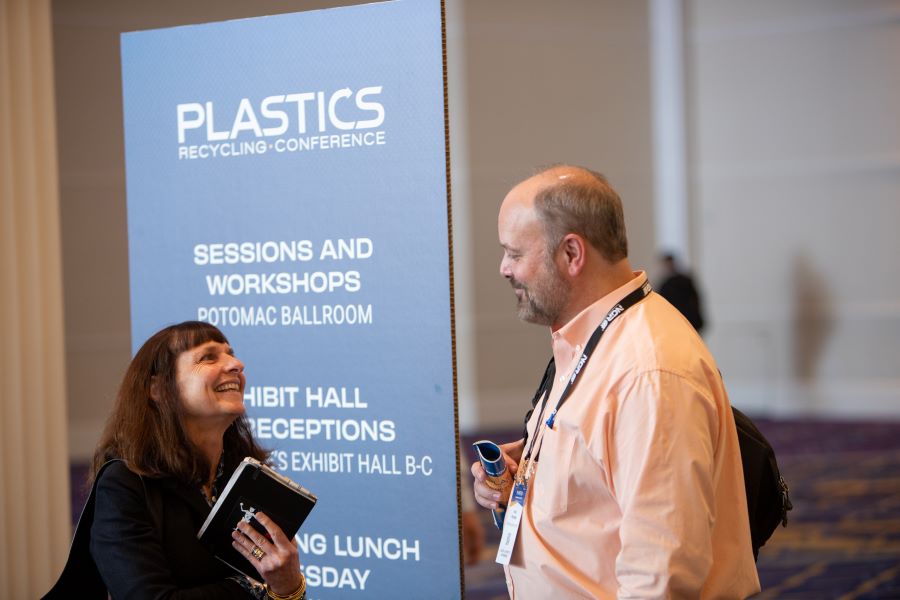
Several recycling stakeholders spoke about engaging with lawmakers to advance legislation in a Monday morning workshop titled “How to Educate Your Policymaker.” | Big Wave Productions/Resource Recycling, Inc.
Nearly 2,700 industry leaders are gathering for the largest-ever Plastics Recycling Conference, taking place outside Washington, D.C.
The 2023 Plastics Recycling Conference is happening as a variety of factors continue to bring unprecedented attention to the business of plastics sustainability. Among those is a drumbeat of bills in state legislatures that shift responsibility for recycling management and funding, increase regulations on the recycling and packaging industries, and boost funding for recycling infrastructure and environmental cleanups.
In Monday morning’s “How to Educate your Policymaker” session, industry players and former legislative representatives gave tips on how to get lawmakers’ attention on industry issues.
Stephanie Baker, director of market development at KW Plastics, suggested that, beyond setting up a meeting, businesses could offer a tour of their facility, then have a photo opportunity and provide swag – as long as the gift falls within state laws.
“They love to have that stuff in their office and on their shelves and to talk about it,” she said.
Baker added that when it comes to laws, “set them up to be the hero. You can have the solution but let them take the credit for it.”
Anja Brandon, associate director of U.S. plastics policy at the Ocean Conservancy, has advocated for legislation in multiple states. She urged attendees in the packed room to be persistent and patient as they push for legislation, because it moves slowly.
“That doesn’t mean you’re not making progress. You just have to accept you’re playing the long game,” Brandon said.
Kate Bailey, who is chief policy officer at the Association of Plastic Recyclers (APR), noted that recycling advocates have been knocking on lawmakers’ doors for decades; now, policymakers are the ones knocking on the recycling stakeholders’ doors. (APR owns Resource Recycling, Inc., publisher of Plastics Recycling Update).
But Bailey cautioned that recycling is still only one of many different issues lawmakers have to address. They move from a hearing on the opioid crisis to recycling, only to finish up and immediately jump to addressing transportation issues.
“Be grateful. They’re doing a hard job,” she said, urging the audience to be responsive when lawmakers and their staff reach out.

The 2023 Plastics Recycling Conference is drawing neary 2,700 industry professionals, a record number for the annual gathering. | Big Wave Productions/Resource Recycling, Inc.
Andrew Cassilly, vice president of government affairs for BioEnergy DevCo and a former member of the Maryland House of Delegates, said all legislators theoretically support recycling, but if you follow them around you find they don’t actually practice it. He encouraged listeners to find out what would make recycling bills attractive to specific lawmakers and tailor pitches for each person.
Todd Kaminsky backed an extended producer responsibility (EPR) bill when he was a member of the New York Senate. New York’s legislature now has multiple EPR bills under consideration.
Kaminsky, who is now a shareholder at multinational law firm Greenberg Traurig, said maybe three legislators in the state really understand the guts of the EPR bill out of a couple hundred total.
He also warned that lawmakers only glancing over bills and getting a surface level understanding is “the reality of the situation” when there are votes happening on hundreds of bills each session.
The conference kicked off yesterday morning with sessions and workshops focused on resin market analysis, recycling policy, the latest sector data and more. In the evening, the networking portion of the event moved into high gear with the opening of the exhibit hall, which features more than 225 plastics sustainability companies and groups.
New this year in the hall is the Innovation Stage. The platform will highlight a number of short presentations from experts on the technical side of plastics recycling.
A wide variety of issues are on the conference session agenda today, including an exclusive presentation from Suzanne Shelton of the Shelton Group on how the public views plastics recycling.
That opening session will be followed up by a panel analyzing plastics recycling’s role in the wider push for materials sustainability. The conversation features voices from APR, the Ocean Foundation, the Plastics Industry Association, Virginia Tech and The Recycling Partnership.
Wednesday morning will kick off with a keynote conversation featuring Monica Medina, a top official at the State Department who is leading the U.S. delegation for the Intergovernmental Negotiating Committee (INC) on Plastic Pollution, also referred to as the Global Plastics Treaty.
Other topics being analyzed on stage this week include the evolution of secondary sortation, durables as an end market, PET thermoform recycling, material supply for chemical recycling and more.
More stories about industry groups
- Q&A: With EPR incoming, end markets are crucial
- NY legislative session ends, again without EPR
- Major plastic initiative sets sights on system change


